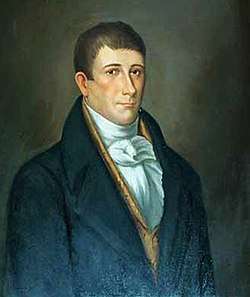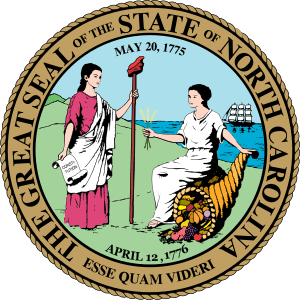Benjamin Williams
Benjamin Williams (January 1, 1751 – July 20, 1814) was the 11th and 14th Governor of the U.S. state of North Carolina, from 1799 to 1802 and from 1807 to 1808. He was the first of two North Carolina Governors since the American Revolution to serve nonconsecutive terms.
Benjamin Williams | |
|---|---|
 | |
| 11th Governor of North Carolina | |
| In office November 23, 1799 – December 6, 1802 | |
| Preceded by | William Richardson Davie |
| Succeeded by | James Turner |
| 14th Governor of North Carolina | |
| In office December 1, 1807 – December 12, 1808 | |
| Preceded by | Nathaniel Alexander |
| Succeeded by | David Stone |
| Member of the U.S. House of Representatives from North Carolina's 10th district | |
| In office March 4, 1793 – March 3, 1795 | |
| Preceded by | District created |
| Succeeded by | Nathan Bryan |
| Member of the North Carolina House of Representatives | |
| In office 1809 | |
| Personal details | |
| Born | January 1, 1751 Johnston County, Province of North Carolina, British America |
| Died | July 20, 1814 (aged 63) Moore County, North Carolina, U.S. |
| Political party | Federalist |
Biography
Williams was born in Johnston County, North Carolina in 1751 and became a farmer. He married Elizabeth Jones on August 10, 1781; they had one son, also named Benjamin.
Williams served as a member of the revolutionary convention in Johnston County in 1774; he then served in the North Carolina Provincial Congress and two terms in the Provincial Council. In 1775, Williams was appointed to the Second North Carolina Regiment; he served until 1781, was promoted to the rank of colonel, and fought at the Battle of Guilford Courthouse. He also served in the Province of North Carolina House of Burgesses in 1775.[1]
Military service:[2]
- Lieutenant in the 2nd North Carolina Regiment (1775-1776)[3]
- Captain in the 2nd North Carolina Regiment (1776-1779)
- Lt. Colonel or Colonel in the Johnston County Regiment of North Carolina militia (1780-1781)
- Lt. Colonel or Colonel over the North Carolina State Regiment (State Troops) (1781)
Williams served in the North Carolina General Assembly during the 1780s, served one term in the United States House of Representatives from 1793 to 1795, and was elected governor in 1799 to fill the unexpired term of William R. Davie, who had resigned. Williams served for three years; during his last year in office, he pardoned Congressional Representative John Stanly, who had killed former Gov. Richard Dobbs Spaight in a duel.
The State Constitution of 1776 limited the post of governor to three one-year terms within a span of six years; Williams sought re-election to the post in 1805, but was defeated by Nathaniel Alexander. In 1807, the General Assembly elected him governor once again, but this time he served only a single term of one year. Williams then retired from politics, except for a single term in the North Carolina Senate in 1809.
Col. Williams was a Mason and was a member of St. John's Lodge in New Bern.
Williams died in 1814 and is buried in Moore County. His home, called House in the Horseshoe, is a tourist attraction operated by the North Carolina Department of Cultural Resources.
References
- Lewis, J.D. "Royal Colony of North Carolina, 27th House of Burgesses". Carolana.com. Retrieved October 24, 2019.
- Lewis, J.D. "The American Revolution in North Carolina, Benjamin Williams". Retrieved March 24, 2019.
- Provincial troops and later continental line
- Biographical Directory of the Governors of the United States, 1789–1978, Robert Sobel and John Raimo, eds. Westport, CT: Meckler Books, 1978. (ISBN 0-930466-00-4)
- NC Department of Cultural Resources
| U.S. House of Representatives | ||
|---|---|---|
| Preceded by District created |
Member of the U.S. House of Representatives from North Carolina's 10th congressional district 1793–1795 |
Succeeded by Nathan Bryan |
| Political offices | ||
| Preceded by William R. Davie |
Governor of North Carolina 1799–1802 |
Succeeded by James Turner |
| Preceded by Nathaniel Alexander |
Governor of North Carolina 1807–1808 |
Succeeded by David Stone |
